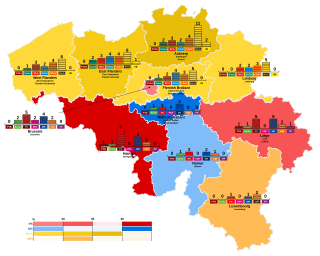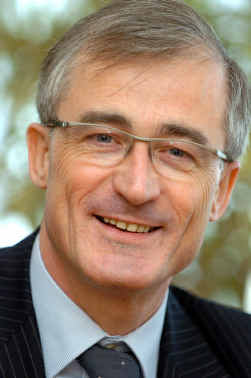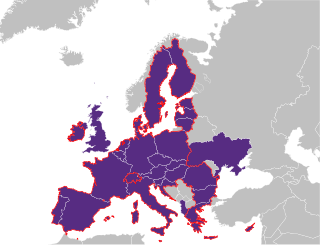
The Parliament of the Brussels-Capital Region is the governing body of the Brussels-Capital Region, one of the three regions of Belgium. It is also known as the Brussels Regional Parliament.

The Federal Parliament is the bicameral parliament of Belgium. It consists of the Chamber of Representatives and the Senate. It sits in the Palace of the Nation in the centre of the nation's capital, Brussels.

Elections to the European Parliament take place every five years by universal adult suffrage; with more than 400 million people eligible to vote, they are the second largest democratic elections in the world after India's.

The Senate is one of the two chambers of the bicameral Federal Parliament of Belgium, the other being the Chamber of Representatives. It is considered to be the "upper house" of the Federal Parliament.

Brussels-Halle-Vilvoorde is a judicial arrondissement encompassing the bilingual—French and Dutch—Brussels-Capital Region, which coincides with the administrative arrondissement of Brussels-Capital and the surrounding Dutch-speaking area of Halle-Vilvoorde, which in turn coincides with the administrative arrondissement of Halle-Vilvoorde. Halle-Vilvoorde contains several municipalities with language facilities, i.e. municipalities where French-speaking people form a considerable part of the population and therefore have special language rights. The arrondissment is the location of a tribunal of first instance, enterprise tribunal and a labour tribunal.

Elections in Belgium are organised for legislative bodies only, and not for executive functions. Direct elections take place for the European Parliament, the Chamber of Representatives, the Parliaments of the Regions, the Parliaments of the Communities, the provincial councils, the municipal councils and the councils of Districts of Antwerp. Voting is mandatory in federal elections, and all elections use proportional representation which in general requires coalition governments.

Members of the European Parliament (MEPs) are elected by the population of the member states of the European Union (EU). The European Electoral Act 2002 allows member states the choice to allocate electoral subdivisions or constituencies for the European Parliament elections in several different ways.

The Dutch-speaking electoral college is one of three constituencies of the European Parliament in Belgium. It currently elects 13 MEPs using the D'Hondt method of party-list proportional representation. Before it elected 14 MEPs, until the 2007 accession of Bulgaria and Romania.

The German-speaking electoral college is one of three constituencies of the European Parliament in Belgium. It elects just one MEP for East Belgium, making it the only such constituency, effectively making it first past the post between parties.

An election of the delegation from Belgium to the European Parliament was held on Sunday, 7 June 2009. The elections were on the same day as regional elections to the Flemish Parliament, Walloon Parliament, Brussels Parliament and the Parliament of the German-speaking Community.
Regional elections were held in Belgium on 7 June 2009 to choose representatives in the regional parliaments of Flanders, Wallonia, Brussels and the German-speaking Community of Belgium. These elections were held on the same day as the European elections.

Federal elections were held in Belgium on 25 May 2014. All 150 members of the Chamber of Representatives were elected, whereas the Senate was no longer directly elected following the 2011–2012 state reform. These were the first elections held under King Philippe's reign.
Regional elections were held in Belgium on 25 May 2014 to choose representatives for the Flemish Parliament, Walloon Parliament, Brussels Parliament and the Parliament of the German-speaking Community. These elections were held on the same day as the 2014 European elections as well as the 2014 Belgian federal election.

An election was held on 25 May 2014 in the three Belgian constituencies to elect the Belgian delegation to the European Parliament. This election, part of the 2014 European Parliament election, was held on the same day alongside the Belgian federal election and the Belgian regional elections.

The 2019 Belgian regional elections took place on Sunday 26 May, the same day as the 2019 European Parliament election as well as the Belgian federal election.

An election was held on 26 May 2019 in the three Belgian constituencies to elect the Belgian delegation to the European Parliament. It was part of the 2019 European Parliament election.

The 2024 European Parliament election in Belgium was held on 9 June 2024 in the three Belgian constituencies to elect the Belgian delegation to the European Parliament. It is part of the 2024 European Parliament election and the 2024 Belgian elections. It was the tenth European Parliament election held in Belgium, and the first to take place after Brexit.
Apportionment by country describes the practices used in various democratic countries around the world for partitioning seats in the parliament among districts or parties. See apportionment (politics) for the general principles and issues related to apportionment.

Volt Belgium is a political party in Belgium. It is part of the pan-European party Volt Europa.
The 2024 Belgian regional elections were held on Sunday 9 June, the same day as the 2024 European Parliament election as well as the Belgian federal election.

















